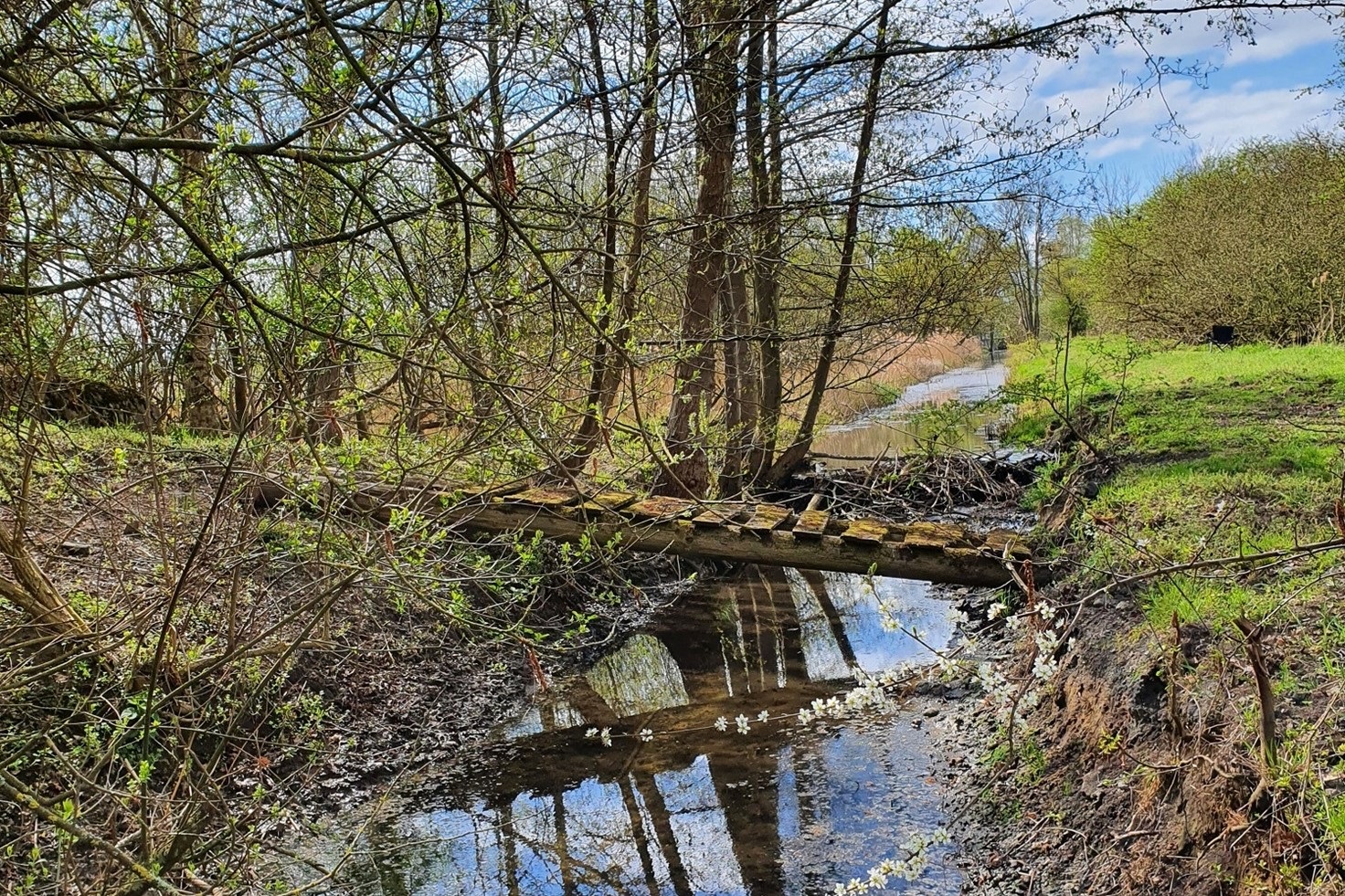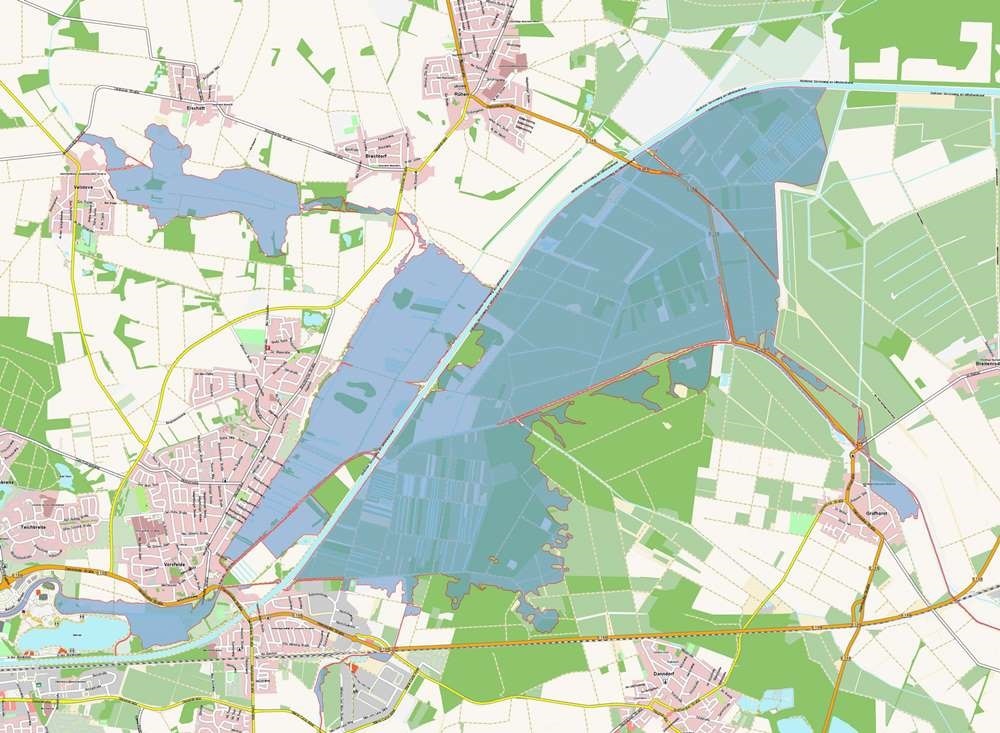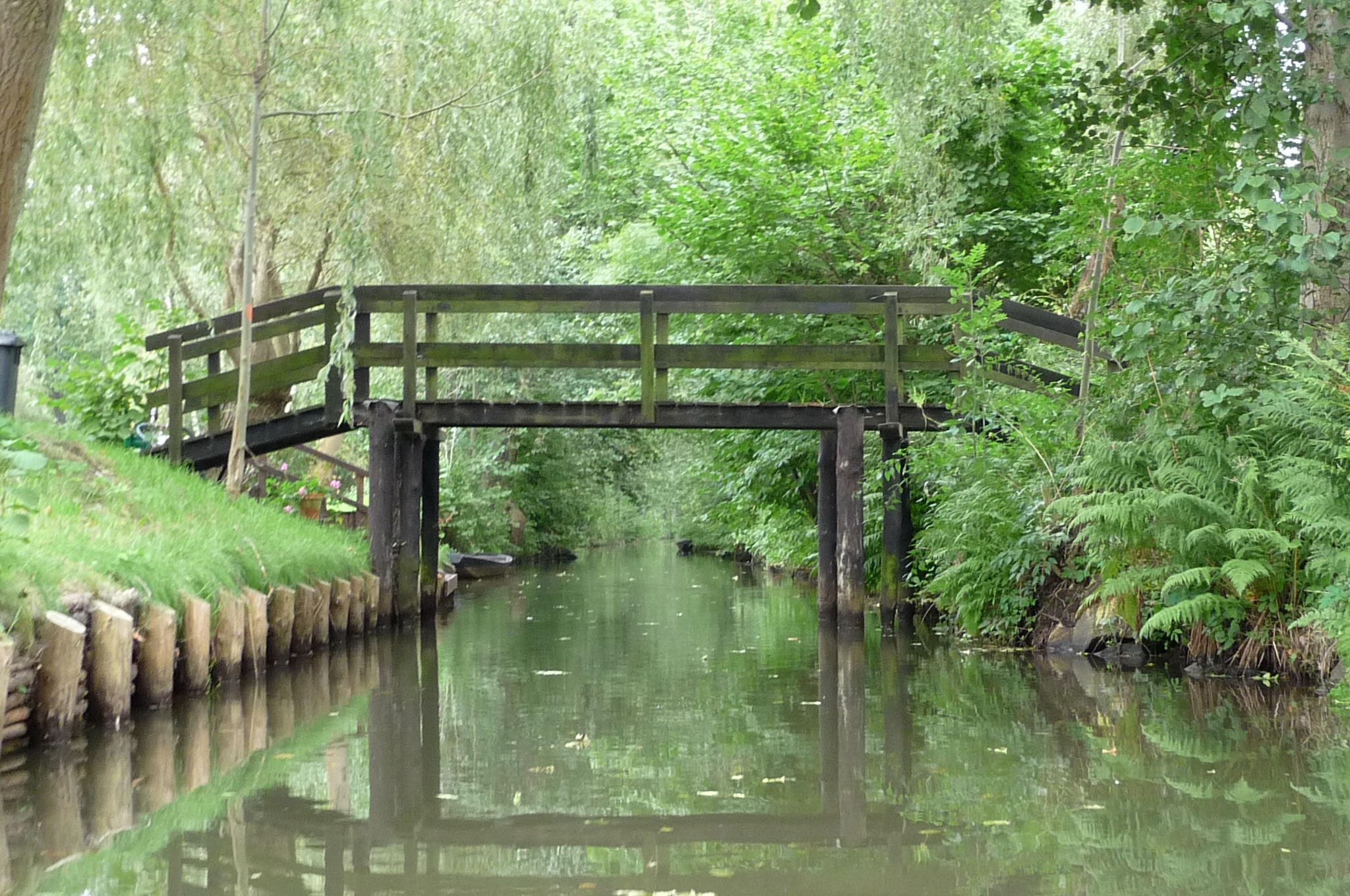
Many uses of water require a permit under water law. You can find out more on this page, or directly from the Lower Water Authority of the City of Wolfsburg.
-
Water use in general
As a rule, the use of a water body requires a permit from the water authority.
The following are considered to be uses of water bodies within the meaning of Section 9 of the German Water Resources Act (WHG):
- the abstraction and discharge of water from surface waters
- the damming and lowering of surface waters
- the introduction and discharge of substances (e.g. collected precipitation water or treated wastewater) into surface waters or into groundwater (see also rainwater -percolation-)
- the extraction and discharge of groundwater (for example, for groundwater lowering or field irrigation)
- Measures that are likely to cause permanent or significant adverse changes in the water quality of surface waters or groundwater (e.g. the construction and operation of geothermal probe systems).
Permission-free water uses (public use) are regulated in Section 32 of the Lower Saxony Water Act (NWG). These are, for example, bathing, diving, watering, scooping with hand vessels, ice sports, driving with vehicles without self-propulsion, as long as the rights of others are not opposed and the rights or the owner or riparian use of others are not impaired.
Contact
Fabian Delert
Room B431
Phone: 05361 28-2752
E-mail: wasserbehoerde@stadt.wolfsburg.de -
Groundwater abstraction (groundwater lowering, field irrigation, wells)
Groundwater abstractions
Groundwater withdrawals can occur through:
- Groundwater drawdown
- Field irrigation
- wells (garden irrigation / fire-fighting wells)
-
Utilization of geothermal energy (geothermal energy)
The use of environmentally friendly geothermal energy for heating purposes is of increasing importance.
-
Precipitation/rainwater
Rainwater is the part of the natural water cycle and normally seeps into the subsoil on the spot. It contributes significantly to the recharge of groundwater . As the water percolates, it passes through various layers of soil, through which it is purified. It then collects in the groundwater-saturated soil zone.
-
Floodplains/floods
Floodplains (ÜSG) are of great importance from the point of view of flood protection in two respects. On the one hand, they allow flood events to flow off without damage; on the other hand, the retention of water in the floodplains can reduce the flood peaks along the watercourse and thus reduce the flood risk for downstream riparians.

-
Indirect discharger
Indirect discharges are wastewater discharges from commercial and industrial operations and from public facilities into the public sewer system. If the wastewater contains hazardous substances, or if it originates from a branch of industry that is likely to contain hazardous substances in the wastewater, the indirect discharge requires a permit in accordance with Section 58 of the Water Resources Act (WHG) in conjunction with Section 98 of the Lower Saxony Water Act (NWG).
-
Small wastewater treatment plants
On properties that cannot be connected to the public wastewater sewer system, domestic wastewater must be treated using small wastewater treatment plants. Small wastewater treatment plants must comply with the generally applicable rules of technology. As a rule, new buildings and retrofits must have a general building authority approval or a manufacturer's declaration of performance. This also regulates the self-monitoring and maintenance of the system. Only in these cases are the properties exempt from the wastewater tax.
The notification form must be used for retrofits or new buildings. The notification must be submitted to the lower water authority for approval.- Statutes of the Wolfsburger Entwässerungsbetriebe (WEB) - Transfer of the wastewater disposal obligation
- Display form
-
Contact
Fabian Delert
Room B 431
Phone: 05361 28-2752
E-mail: wasserbehoerde@stadt.wolfsburg.de
Ingeburg Schoß
Room B 430
Phone: 05361 28-2513
E-mail: wasserbehoerde@stadt.wolfsburg.de
-
Water reuse
In Wolfsburg and Gifhorn, wastewater from the municipal sewage treatment plant has been irrigated on the surrounding agricultural land for decades.
The light soils in the north of Wolfsburg require summer irrigation, as the natural water supply and the natural water retention capacity of the soils are not sufficient for agricultural use without irrigation.
The production of and irrigation with treated water for agricultural irrigation requires authorization in accordance with Article 6 REGULATION (EU) 2020/741 OF THE EUROPEAN PARLIAMENT AND OF THE COUNCIL of 25 May 2020 on minimum requirements for water reuse.
With the decisions of 15.04. and 16.04.2025, Wolfsburger Entwässerungsbetriebe and Abwasserverband Wolfsburg were approved for the production and irrigation of treated water for agricultural irrigation respectively.
-
Facilities on the watercourse
Installations in, on, above and below surface waters
Installations in, on, above and below surface waters must be constructed, maintained and operated in such a way that no harmful changes to the watercourse are to be expected and the maintenance of the watercourse is not made unnecessarily difficult.
These installations include structures such as- buildings
- bridges and footbridges
- Underpasses, pipes and culverts
- landing stages
- embankments and excavations
A permit from the lower water authority is required for the construction and significant modification of such facilities.
Required documents:
- Application form for installations on watercourses or watercourse crossings
- Explanatory report
- general plan
- Section of cadastral map
- Longitudinal and cross sections
- Detailed drawings
- Hydraulic calculation, if applicable
Contact
Laura Rabe
Room B430
Phone: 05361 28-5174
E-mail: wasserbehoerde@stadt.wolfsburg.de -
Ponds/still waters
The construction of ponds/still waters is a form of watercourse development and therefore requires a permit if they are fed by groundwater (without sealing) or surface water.
Depending on their scope and size, they may require planning permission.
A planning approval procedure is required for the creation of a watercourse. Instead of the planning approval procedure, a planning approval procedure can also be carried out if, according to the- Environmental Impact Assessment Act and the
- Lower Saxony Environmental Impact Assessment Act
there is no obligation to carry out an environmental impact assessment.
Required documents:
- Application form for planning permission
- Explanatory report
- General plan
- Section of the cadastral map
- Longitudinal and cross sections
- Detailed drawings
- Hydraulic calculation, if applicable
Contact
Laura Rabe
Room B 430
Phone: 05361 28-5174
E-mail: wasserbehoerde@stadt.wolfsburg.de -
Watercourse development

According to the German Federal Water Act (WHG), a watercourse development is the creation, removal or significant alteration of a watercourse or its banks.
A significant alteration occurs when the watercourse is permanently and significantly changed, for example by- Changes to the course (straightening, relocation, lengthening of the course)
- deepening
- piping
- Demolition of transverse structures
A planning approval procedure is required for watercourse development. Instead of the planning approval procedure, a planning approval procedure can also be carried out if, in accordance with the
- Environmental Impact Assessment Act and the
- Lower Saxony Environmental Impact Assessment Act
there is no obligation to carry out an environmental impact assessment.
Required documents:
- Application form for planning permission
- Explanatory report
- General plan
- Section of cadastral map
- Longitudinal and cross sections
- Detailed drawings
- Hydraulic calculation
Contact
Laura Rabe
Room B 430
Phone: 05361 28-5174
E-mail: wasserbehoerde@stadt.wolfsburg.de -
Water maintenance
The maintenance of a surface water body includes its care and development as an obligation under public law. It must be oriented to the management objectives.
-
Substances hazardous to water
Substances hazardous to water are solid, liquid and gaseous substances that are capable of permanently and adversely changing the physical, chemical or biological properties of the water.
-
Water Framework Directive WFD
The objective of the European Water Framework Directive (EC-WFD) for surface waters is to ensure (prohibition of deterioration) or develop a good ecological and chemical status.
-
Legal basis
The legal bases for the work of the lower water authority are
- the Water Resources Act
- the Lower Saxony Water Act
and other legal regulations.
-
Contact
City of Wolfsburg Mona Markgraf Lower Water Authority Head of department Town Hall B, Rooms 430-432 and 440 Telephone: 05361 28-1960 Porschestrasse 49 38440 Wolfsburg Randolf Fiebich Phone: 05361 28-1234 Deputy Head of Department E-mail to the Lower Water Authority Telephone: 05361 28-1686 Fabian Delert
Specialist responsible for the Lower Water Authority
Room B431
Telephone: 05361 28-2752
wasserbehoerde@stadt.wolfsburg.deIngeburg Schoß
Room B 430
Phone: 05361 28-2513
wasserbehoerde@stadt.wolfsburg.deLaura Rabe
Room B 430
Phone: 05361 28-5174
wasserbehoerde@stadt.wolfsburg.deJulia Rutsch
Room B 431
Phone: 05361 28-1875
wasserbehoerde@stadt.wolfsburg.deBianca Grune
Room B 432
Phone: 05361 28-2425
wasserbehoerde@stadt.wolfsburg.deNina Krause
Room B 440
Phone: 05361 28-1961
wasserbehoerde@stadt.wolfsburg.deJeannine Diesner
Room B 440
Phone: 05361 28-1519
wasserbehoerde@stadt.wolfsburg.dePascal Becker
Room B 432
Phone: 05361 28-5208
wasserbehoerde@stadt.wolfsburg.de
